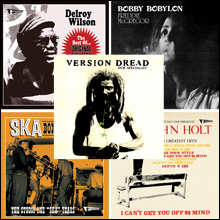
Motown, Memphis, and the sounds of black America serve as crucial symbols on these songs about Jamaican aspirations. |
Heartbeat Records’ Studio One reissue series continues not only to shore up the legacy of Studio One honcho Coxsone Dodd but to present an expansive, rich portrait of Jamaican popular music. Ska Bonanza, a two-CD set collecting 44 songs, offers listeners a wide-lens perspective on the pre-reggae sound of 1960s Jamaican pop. Gaining prominence just as Jamaica gained independence from England in 1962, ska emerged as jazz, R&B, and Latin dance styles were defining cosmopolitan cool from Chicago to Cape Town. Swing was king, even in Jamaica, and many of the island’s jazzmen played in big bands and on cruise ships, cutting their teeth on Lester Young solos over romps borrowed from Basie. As they were spurred by Dodd to record for the local market, ska gave Jamaica’s best musicians a chance to play to home-town tastes, blowing soul-jazz style over hopped-up, localized R&B songs, mambo numbers, and movie themes. The music features more elaborate chord changes and 12/8 shuffles than most subsequent Jamaican pop, but the players sway as much as they swing, adding a characteristically Caribbean lilt to that ol’ American push-pull.
For all their localization, many tracks on Ska Bonanza demonstrate a sustained engagement with American and international pop, sometimes in the form of awkward imitations but often in a delightful, distinctive funhouse-mirror manner. The many covers of familiar pop songs on Ska Bonanza are fine examples of the cherished tradition of “versioning” in Jamaican music: Smokey Robinson gets interpolated, to use the contemporary legalese, as his “Choosy Beggar” becomes Rita Marley’s “A De Pon Dem”; the Four Tops’ well-worn “Same Old Song” gets a new set of lyrics and an otherwise remarkably reverent treatment on the Gaylads’ “Stop Making Love.” On the more local side, the young Lee Perry’s charmingly bawdy booty tune “Sugar Bag” sounds downright demure next to the non-nuendo of Jackie Opel’s “Push Wood.” The instrumental numbers are as numerous as the vocal cuts, fine vehicles for the sinuous solos of trombonist Don Drummond and saxophonists Roland Alphonso and Tommy McCook and their woodsheddin’ brethren. There are lots of songs about broken hearts and rude boys; there’s plenty of proto-beatboxing. The collection runs the gamut from inspired anthems to treacly ballads. Some numbers are transcendent in form and content, lovingly touched up, brilliantly and warmly recorded. Others sound more dated. All are valuable in offering a good sense of ska style.

Despite its foreign infusions, ska for many represented a modern Jamaica coming into its own, embodying hopes and dreams in its bouncy, uplifting grooves, cosmo cool, and local character. As ska gave way to the slower strains of rocksteady a few years later, many heard in the music a fading ebullience. But people still sang of Jamaican aspirations, and once again the sounds of black America served as symbols. A trio of Heartbeat’s other recent releases help to chart this complex terrain, collections representing the peak rocksteady and foundational reggae recordings of Alton Ellis, Delroy Wilson, and John Holt. Under Dodd’s hand and supported by Studio One’s inimitable house band, the three singers rose to prominence in the mid to late ’60s. Motown and Memphis figure big. Steeped in the Sam Cooke school of soul crooning but boasting an edge all his own, Ellis with his smooth tenor helped herald the shift from ska’s forward march to rocksteady’s easy skank. Often featuring his sister Hortense, I’m Still in Love with You showcases the siblings on a solid set of songs about longing, love, and the Lord.
Another early star for Studio One, Delroy Wilson got his start as a 15-year-old weapon for Dodd’s soundsystem, recording “specials” to ridicule opponents. That youth may explain why his soulful turns often sound less self-conscious than those of his predecessors or his contemporaries. His take on the Temptations’ “Get Ready” (from Heartbeat’s The Best of . . . Original Eighteen) shows at once how original Jamaican versions of American pop songs can be. John Holt has a haunting voice that’s appropriate for the sort of over-possessive love songs that were once all the vogue (and now are mercifully rare, if not quite quaint). He gives shape to worlds of possibility amid bleak social and political landscapes, and embitterment and disappoint exist alongside celebration and faith. Supported by the Paragons on the cautionary “Change Your Style” (from his Studio One collection I Can’t Get You Off My Mind), the singer addresses Kingston’s infamous, rebellious youths. “Hooligan business cold,” Holt harmonizes, “let only love fill your soul.” He throws in a cover of George Harrison’s famous R&B ripoff (“My Sweet Lord”) for good, mirror-mirror measure.